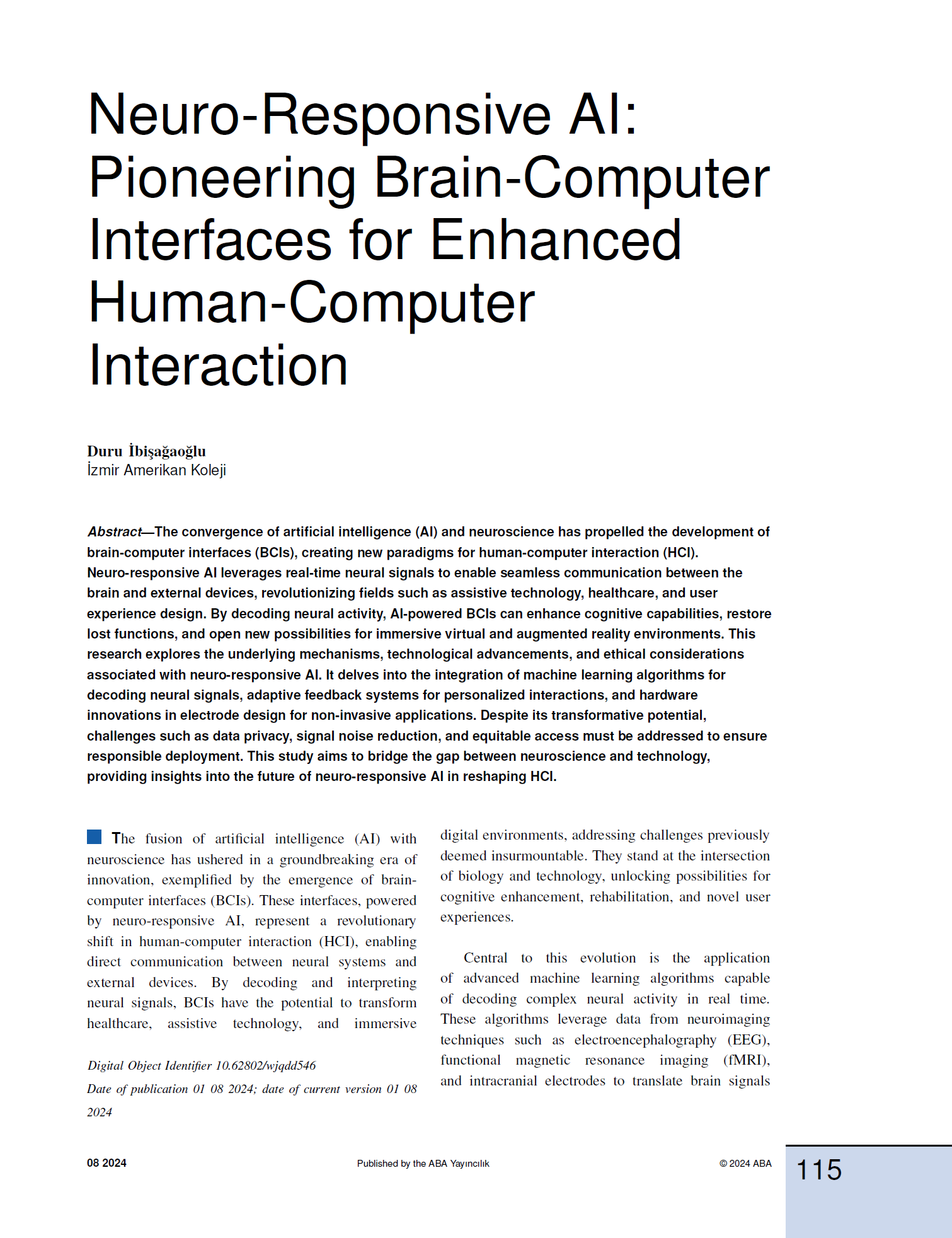Neuro-Responsive AI: Pioneering Brain-Computer Interfaces for Enhanced Human-Computer Interaction
DOI:
https://doi.org/10.62802/qpefwc98Keywords:
Neuro-responsive AI, brain-computer interface, human-computer interaction, neural decoding, assistive technology, cognitive enhancement, machine learning, signal processing, ethical considerations, virtual realityAbstract
The convergence of artificial intelligence (AI) and neuroscience has propelled the development of brain-computer interfaces (BCIs), creating new paradigms for human-computer interaction (HCI). Neuro-responsive AI leverages real-time neural signals to enable seamless communication between the brain and external devices, revolutionizing fields such as assistive technology, healthcare, and user experience design. By decoding neural activity, AI-powered BCIs can enhance cognitive capabilities, restore lost functions, and open new possibilities for immersive virtual and augmented reality environments. This research explores the underlying mechanisms, technological advancements, and ethical considerations associated with neuro-responsive AI. It delves into the integration of machine learning algorithms for decoding neural signals, adaptive feedback systems for personalized interactions, and hardware innovations in electrode design for non-invasive applications. Despite its transformative potential, challenges such as data privacy, signal noise reduction, and equitable access must be addressed to ensure responsible deployment. This study aims to bridge the gap between neuroscience and technology, providing insights into the future of neuro-responsive AI in reshaping HCI.
References
Almusaed, A., Yitmen, I., Almssad, A., & Myhren, J. A. (2024). Construction 5.0 and Sustainable Neuro-Responsive Habitats: Integrating the Brain–Computer Interface and Building Information Modeling in Smart Residential Spaces. Sustainability, 16(21), 9393.
Awuah, W. A., Ahluwalia, A., Darko, K., Sanker, V., Tan, J. K., Pearl, T. O., ... & Atallah, O. (2024). Bridging minds and machines: the recent advances of brain-computer interfaces in neurological and neurosurgical applications. World Neurosurgery.
Cruz, M. V., Jamal, S., & Sethuraman, S. C. (2024). A Comprehensive Survey of Brain-Computer Interface Technology in Healthcare: Research Perspectives.
Ding, Z., Ji, Y., Gan, Y., Wang, Y., & Xia, Y. (2024). Current status and trends of technology, methods, and applications of Human–Computer Intelligent Interaction (HCII): A bibliometric research. Multimedia Tools and Applications, 1-34.
Elsayed, O. From Mind to Machine: A Comprehensive Review of Brain-Computer Interfaces.
Farzan, F. (2025). Brain-computer interface. In Handbook of Neural Engineering (pp. 351-388). Academic Press.
Kholiya, K. (2024). NEUROSCIENCE AND BRAIN-COMPUTER INTERFACES: UNRAVELING THE SECRETS OF THE MIND.
SANDUA, D. (2024). NEUROTECHNOLOGY: BRAIN-COMPUTER-INTERFACE AND THE FUTURE OF HUMANITY. David Sandua.
Sood, S. (2024). Brain Technology in Augmented Cognition: Current and Future Trends.
Wei, H. (2024). From Brain–Computer Interfaces to AI-Enhanced Diagnostics: Developing Cutting-Edge Tools for Medical and Interactive Technologies (Doctoral dissertation, Columbia University).









